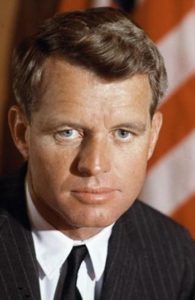
Robert F. Kennedy
*Robert 'Bobby' Kennedy was born on this date in 1925. He was a white-American politician, lawyer, and author.
Robert Francis Kennedy was born in Brookline, Massachusetts, and was the seventh child of Joseph P. Kennedy Sr. and Rose Kennedy. After serving in the U.S. Naval Reserve as a seaman apprentice from 1944 to 1946, Kennedy returned to Harvard University and graduated in 1948. He received his law degree from the University of Virginia and was admitted to the Massachusetts bar in 1951.
Before entering public office, he worked as a correspondent for The Boston Post and as an assistant counsel to the Senate committee chaired by Senator Joseph McCarthy. He began his political career the following year as the manager for his brother John's successful campaign for the U.S. Senate. He gained national attention as the chief counsel of the Senate Labor Rackets Committee from 1957 to 1959, where he publicly challenged Teamsters President Jimmy Hoffa over the corrupt practices of its union and authored The Enemy Within, a book about corruption in organized labor.
Kennedy resigned from the committee to conduct his brother's campaign in the 1960 presidential election. After his brother won, he was appointed United States Attorney General from 1961 to 1963. In 1961, he predicted that an African American "can also achieve the same position that my brother has as President of the United States" over the next thirty to forty years. An American political scientist and political analyst, Larry Sabato, would later write, "When RFK's family backed Barack Obama in 2008, they picked a candidate with great differences in upbringing from that of the privileged President Kennedy.”
In February 1962, FBI Director J. Edgar Hoover, who viewed civil rights leader Martin Luther King Jr. as an upstart troublemaker, calling him an "enemy of the state," presented Kennedy with allegations that some of King's close confidants and advisers were communists. Concerned about the allegations, the FBI deployed agents to monitor King in the following months. Kennedy warned King to discontinue the suspected associations. In October 1963, Kennedy issued a written directive authorizing the FBI to wiretap King and other Southern Christian Leadership Conference leaders, King's civil rights organization.
In response, King agreed to ask suspected Communist Jack O'Dell to resign from the SCLC but refused to heed the request to ask Stanley Levison, whom he regarded as a trusted advisor, to resign. Although Kennedy only gave written approval for limited wiretapping of King's phones "on a trial basis, for a month or so," Hoover extended the clearance so that his men were "unshackled" to look for evidence in any areas of King's life they deemed worthy. The wiretapping continued through June 1966 and was revealed two years later.
Kennedy remained committed to American Civil Rights enforcement, from prosecuting corrupt white Southern electoral officials to answering late-night calls from Coretta Scott King concerning her husband's imprisonment for demonstrations. During his tenure as attorney general, he undertook the most energetic and persistent desegregation of the administration that Capitol Hill had ever experienced. He demanded that every area of government begin recruiting realistic levels of Black and other ethnic workers, going so far as to criticize Vice President Johnson for failure to desegregate his office staff.
However, relations between Kennedy and civil rights activists could be tense, partly due to the administration's decision that several complaints that King filed with the Justice Department between 1961 and 1963 be handled "through negotiation between the local city commission and Negro citizens." Much federal executive support for the American Civil Rights movement between 1960 and 1963 was the result of the passion and determination of Robert Kennedy. His rapid education in the realities of Southern racism converted his purpose as attorney general. In an interview in May 1962, "What do you see as the big problem ahead for you? Is it a crime or internal security?" Kennedy replied, "Civil rights."
In 1968, he was a leading presidential candidate for the Democratic nomination. He appealed to poor, Black, Hispanic, Catholic, and young voters. He was often seen as a representation of contemporary white American liberalism. He defeated Senator Eugene McCarthy in the California and South Dakota presidential primaries.
Shortly after midnight on June 5, 1968, Kennedy was mortally wounded by Sirhan Sirhan, a 24-year-old Palestinian, because he had advocated American support for Israel following the 1967 Six-Day War. Kennedy died the following day (June 6th), and Sirhan was imprisoned for life. As with the assassination of Malcolm X, Dr. King, and his brother, Robert Kennedy's assassination has been the subject of widespread analysis and numerous conspiracy theories.